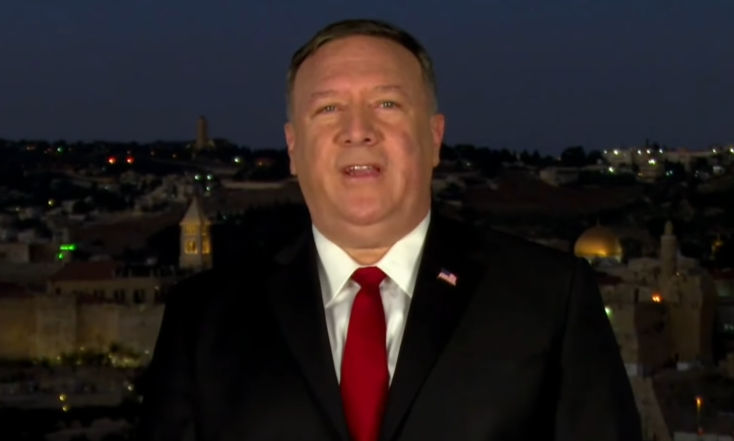Secretary of State Mike Pompeo’s speech from Jerusalem for the Republican National Convention sent a strong signal to the American people and the world about the U.S. and President Donald Trump’s strong commitment to U.S. ally, Israel, strengthening diplomatic relations among her neighbors and opposing Iran.
While the speech caught the attention of many observers because of its downstream political implications, including the potential future of Secretary Pompeo, what is more telling is it served as visual proof, a symbol that President Trump has done what his predecessors had only promised to. He moved the U.S. embassy to Israel’s capital in Jerusalem, and declared unequivocally that U.S. policy is to keep the capital there.
In fact, President Trump is the first president in U.S. history to fully recognize Israel’s right to say where its capital is.
Pompeo praised President Trump’s diplomatic efforts he is leading, saying, “The president too moved the U.S. embassy to this very city of God, Jerusalem, the rightful capital of the Jewish homeland, and just two weeks ago, the president brokered a historic peace deal between Israel and the United Arab Emirates. This is a deal that our grandchildren will read about in their history books.”
In 1995, Congress passed the Jerusalem Embassy Act which declared Jerusalem as the capital of Israel and said it should not be divided, requiring the U.S. embassy to be moved to Jerusalem by 1999. President Bill Clinton never signed the law.
Instead, Presidents Clinton, George W. Bush, Barack Obama and Donald Trump all signed waivers to postpone recognition of Jerusalem as the capital, as U.S. policy was that the status of Jerusalem would be settled via negotiations. Now, with President Trump’s action to finally move the embassy, there’s nothing left to negotiate.
“Secretary Pompeo’s speech from Jerusalem underscores a critical truth. President Trump has been a tremendous friend of Israel – and has kept his promises, including advancing peace in the Middle East and moving the U.S. Embassy to Jerusalem,” said Adam Milstein, co-founder and former chairman of the Israeli-American Council.
This is a turning point for U.S. policy. Jerusalem has always been the capital of Israel. We’re not going to go back in time and turn over territory that has been rightfully held since 1967, and officially established as the unified capital by the Israeli Knesset since 1980. President Trump has settled a long-held point of confrontation between Israel and her neighbors, and creates a path forward in the region.
Milstein added, “Secretary Pompeo made clear to the American people and the international community that the U.S. will not retreat from defending America’s interests around the globe and supporting our allies.”
Pompeo’s speech also put an exclamation point on the historic normalization and peace agreement between Israel and the United Arab Emirates that President Trump just successfully concluded. It shows Trump’s embrace of Israeli sovereignty was not a barrier to peace but a necessary precondition. They may not immediately agree on the topic of Jerusalem — United Arab Emirates will establish its embassy in Tel Aviv — but at least they’re talking.
As expressed in the historic agreement, “The parties will continue their efforts in this regard to achieve a just, comprehensive and enduring resolution to the Israeli-Palestinian conflict. As set forth in the Vision for Peace, all Muslims who come in peace may visit and pray at the Al Aqsa Mosque, and Jerusalem’s other holy sites should remain open for peaceful worshippers of all faiths.”
Secretary Pompeo and Milstein are right. Presidents for decades have attempted to normalize relations between Israel and her neighbors since Israel and Egypt signed a peace treaty in 1979, but with little success. Now, President Trump is the one making a breakthrough.
The speech also served as a reminder that President Trump kept his promise to tear up the Obama-Biden nuclear deal with Iran that had them on a fast track to obtaining nuclear weapons to threaten regional and national security, with Pompeo noting, “The president exited the U.S. from the disastrous nuclear deal with Iran and squeezed the Ayatollah, Hezbollah, and Hamas.”
Trump’s hard line against Iran made the pivot toward Israel and the Arab states more possible, and could be the key to regional stability at long last.
Milstein praised the Trump foreign policy, noting, “Under the Trump administration, America’s strengthened alliances with Israel and other Arab states is a vital national security asset that has weakened the forces of extremism in the region, particularly the Iranian regime.”
And with Israeli Prime Minister Benjamin Netanyahu securing a budget deal for the next four months, proving he still has a functional majority, it gives Israel breathing room to build on the success with the United Arab Emirates.
Secretary Pompeo highlighted President Trump’s success in concluding U.S. military commitments in the region, “Today, because of the president’s determination and leadership, the ISIS caliphate is wiped out, it’s gone. It’s evil leader, Abu Bakr al-Baghdadi, is dead and our brave soldiers, they’re on their way home.”
While President Trump is reducing the U.S. military footprint throughout the Middle East, he is strengthening diplomatic relations across the region — especially with our closest ally in the region, Israel, after eight years of those relations being undermined by former President Barack Obama. For the first time in decades, peace and stability is being returned to the region, and Israel and her neighbors can thank President Trump.
Robert Romano is the Vice President of Public Policy at Americans for Limited Government.







